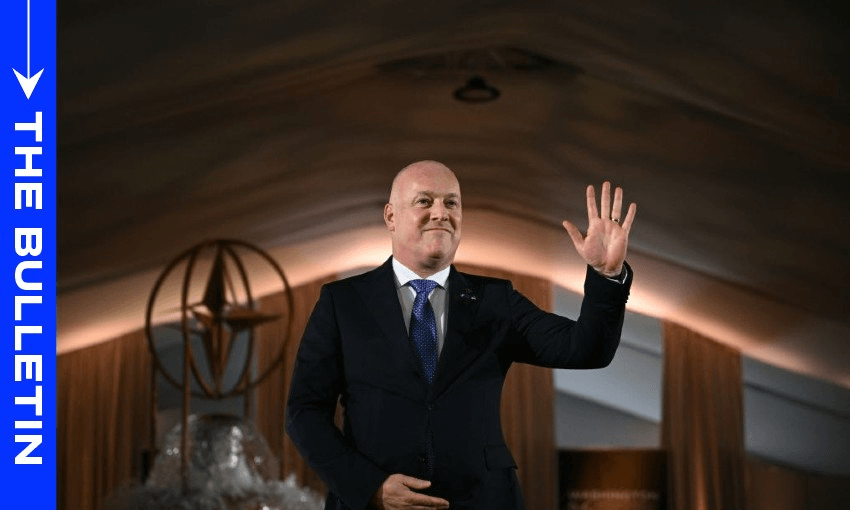With all eyes on the health of US president Joe Biden, an Oval Office visit for our PM seems near impossible. Stewart Sowman-Lund explains why in this extract from The Bulletin. To receive The Bulletin in full each weekday, sign up here.
Diplomatic speed dating
In what is one of the biggest tests of Christopher Luxon’s diplomatic skills to date, the prime minister is in Washington DC, schmoozing with world leaders and lawmakers alike. Earlier in the week, the PM bounced around the US Capitol meeting with a range of high profile senators and congresspeople from both sides of the political aisle. The Post’s Luke Malpass wrapped that part of Luxon’s tour here, reporting that he met with American leaders critical to the Pacific relationship, including the “de facto Indo-Pacific tsar” Kurt Campbell, the US deputy secretary of state.
Next on the agenda – and the primary reason for Luxon’s visit – is the Nato summit. The prime minister will be gunning for face time with US president Joe Biden – even if it’s just a quick hand shake and “hello”. If he misses that, he still has a busy agenda, reports RNZ’s Jo Moir. Luxon will host bilateral talks today with France’s Emmanuel Macron, Canada’s Justin Trudeau, and Estonia’s Kaja Kallas, along with senior Republican (and Trump backer) Ted Cruz. In news sure to fire up a certain community, Luxon just shared a photo on social media with BlackRock CEO. The investment firm partnered with New Zealand on a climate fund, announced last year.
A tense backdrop
As we’ve talked about in previous Bulletins, the coalition is going hard and fast on strengthening diplomatic ties. And with that comes the myriad of tightropes that need to be walked. Luxon and his team of senior foreign ministers, including Winston Peters, have so far been adept at managing this. The visit to Washington is no different, coming against the backdrop of ongoing questions about the health of president Joe Biden and the increasing possibility that Donald Trump could soon be back in the White House. As the Herald’s Claire Trevett writes, Luxon isn’t touching either of these topics with a barge pole. Speaking to reporters in front of the US Capitol building – a perfect backdrop for a self-confessed American politics junkie – Luxon spent most of his press conference reiterating his consistent line that he would not get involved in US political issues. It’s the right, albeit safe, call for a relatively rookie prime minister, though does little to dispel concerns being raised back in New Zealand about what a second Trump term could mean for trade with the United States given the former president’s plan for a universal tariff.
In worse news for Biden, high profile supporter George Clooney has urged the president to step aside in an open letter published in the New York Times overnight. “We are not going to win with this president.”
Oval Office a no go
Clearly, the goal for any New Zealand prime minister visiting Washington is a visit to the White House. A closed door sit down with the US president would be the ultimate coup for Luxon, though it appears off the cards at this point, reported Tova O’Brien for ThreeNews. Not only is there intense domestic scrutiny on Biden’s performance, but given he is hosting dozens of nations in his own backyard for Nato, New Zealand is likely not a top priority. Jacinda Ardern scored time with Biden back in 2022, but that was the first serious meeting with a US president since John Key and Barack Obama several years prior. Donald Trump’s tenure got in the way, though he made time for Ardern on the sidelines of the United Nations general assembly in 2019. At the time, foreign minister Winston Peters described the 25 minute meeting as a triumph. “In the world of diplomacy, this level of engagement is gold,” said Peters.
So could another less formal “triumph” be on the cards again this time? Luxon hasn’t been willing to speculate, telling reporters it’s not a “focus” of his visit, though he is attending a White House dinner hosted by Biden later today. His frequent confidante Sir John Key may beg to differ on whether a meeting should be a focus, telling Claire Trevett in 2022 that it was important not to let the US relationship drift and adding that “the White House is critical”. If he’d prefer to listen to Helen Clark, she spoke to The Spinoff’s Toby Manhire about the significance of a presidential meet-and-greet a couple of years back.
The Nato relationship
President Biden is older than Nato, Stuff’s Tova O’Brien reminded us all yesterday. It’s the 75th birthday of the Cold War-era alliance, though it’s hardly a celebration this year. The ongoing Ukraine conflict has bolstered Nato, or at least made it more relevant. That’s part of the reason New Zealand has been invited to attend the summit for the third year in a row (with our third prime minister after Jacinda Ardern and Chris Hipkins) and the second tightrope the prime minister has to walk. Luxon timed his appearance at Nato with the promise of further aid for Ukraine, announced yesterday morning. As Newsroom’s Sam Sachdeva wrote, the repeated invites for New Zealand show that our ties to Nato are strengthening, and also that issues of security are increasingly becoming global as opposed to matters tied to particular regions. We’ve seen that in our part of the world as well with nations, the US included, competing for Pacific influence, as this map by The Guardian illustrates.


